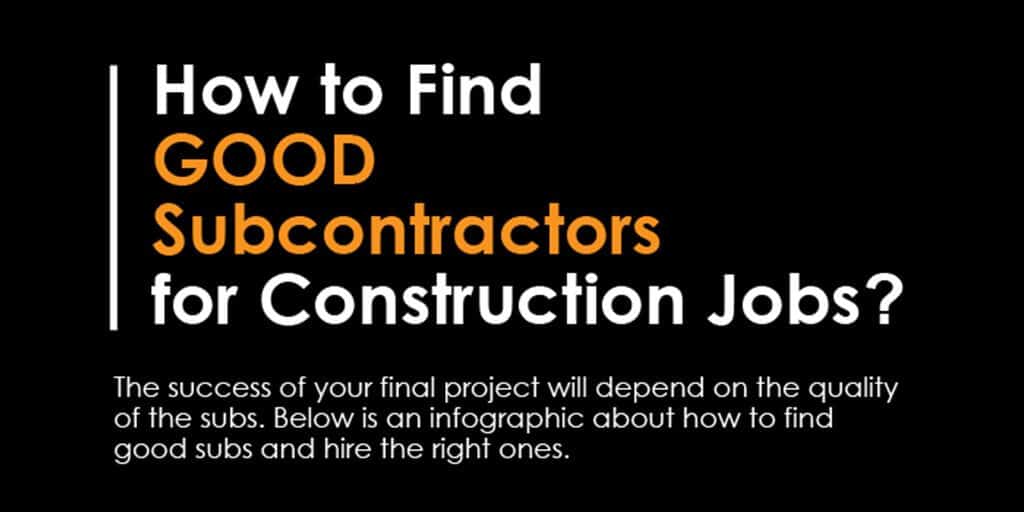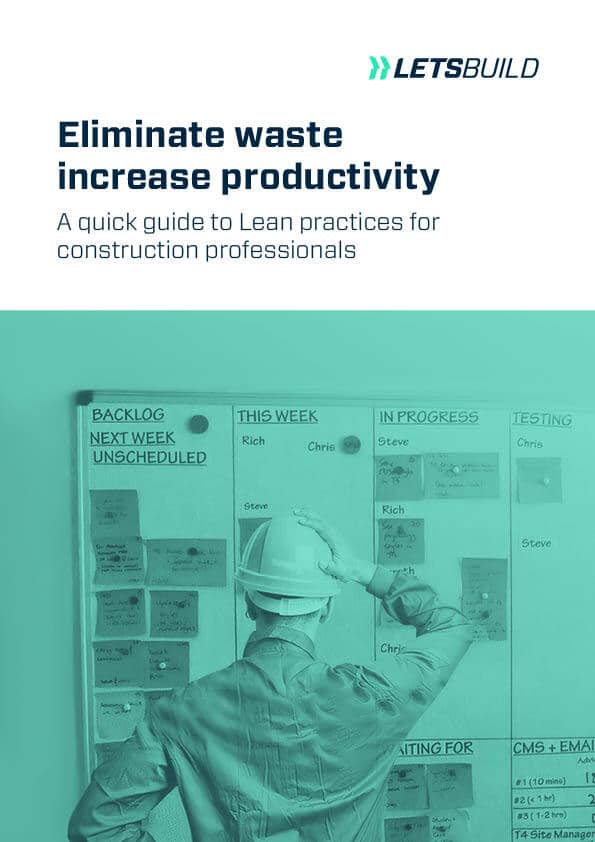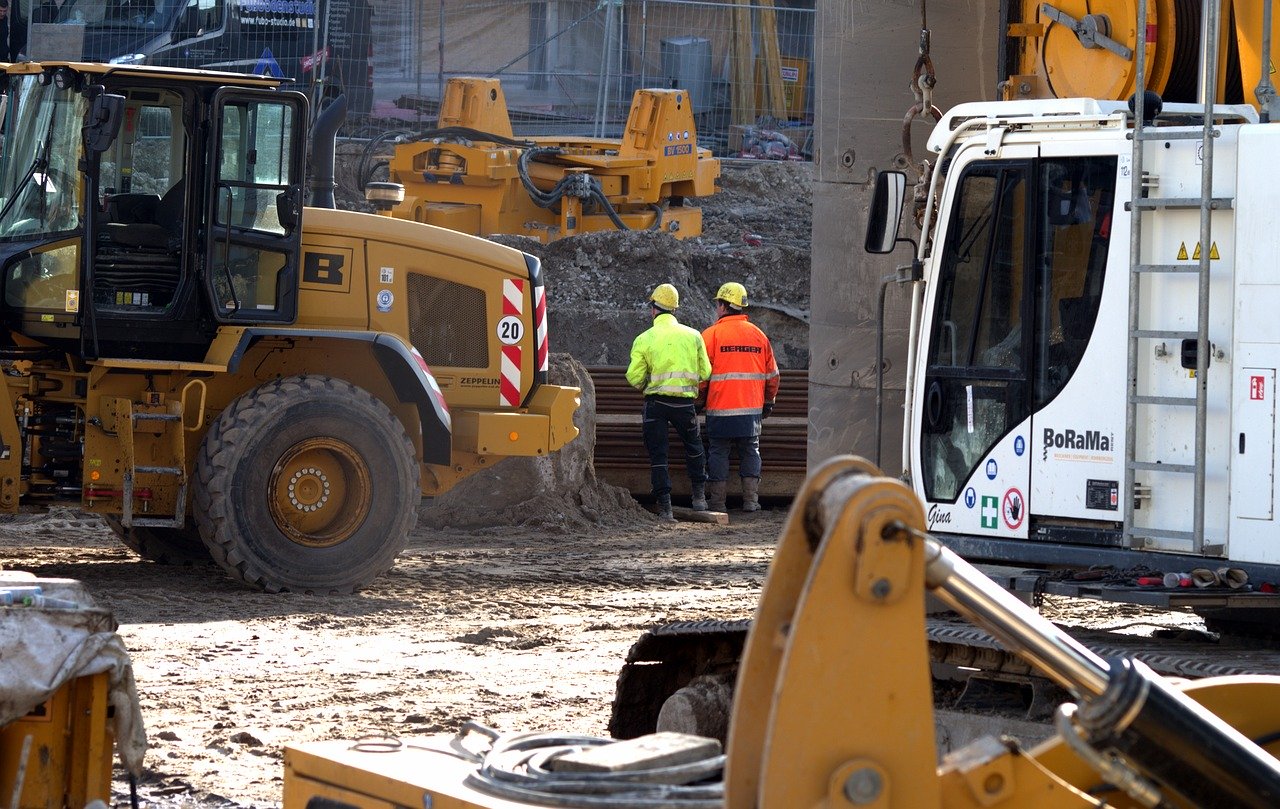How to find good subcontractors?
- Ask around
- Ask friends in the construction industry
- Local social media groups, community bulletins, or message boards
- Drive-by
- Current or past subs
- Specialty suppliers
- Online search

Most large construction companies tend to seek the help of various types of subcontractors for doing a significant part of the project’s work. In fact, more often than not, they hire very few trades-persons but many subcontractors for most tasks that they either don’t have the resources to work on or simply choose not to do themselves.
That being said, the success of your final project may very well depend on the quality of workmanship the subs. So without further ado, let’s find out how exactly to go about hiring good subs.
Where to find good subcontractors?
Well, finding subs isn’t rocket science, neither does it involve any special skills. In fact, it’s pretty much the same process as hiring a general contractor, and perhaps even a doctor, accountant, or any other professional.
Ask around:
So the first thing you would want to do is ask your friends and neighbors for references, as well as find out whether there are subs working in your neighborhood on a project.
Ask friends in the construction industry:
More importantly than asking people you know is asking the people that would actually understand the difference between great and mediocre. These days you’ll find that some contractors prefer not to give out the information of their best workers but depending on how close you are with your “competition,” they may be willing to lend a hand.
Local social media groups, community bulletins, or message boards:
If you start doing a little googling you will find online groups, forums, and message boards that relate to your city or region. Within these there’s always room for “general questions.” People love feeling like they’ve helped someone by recommending a good source. You might be pleasantly surprised by the results.
Drive by:
You should know your surrounding area enough to find out where projects are currently happening. Simply introduce yourself to them and ask for a business card. You can also take a look at the work done if it’s visible outside. If it’s not easy to see from the outside, you may want to ask the owner whether you can take a look at the work done.
Current or past subs:
Take a look at some of the past and current subs you’re working with. Consider asking them for recommendations but make sure to position the question as “information gathering” so they don’t think you’re trying to skirt around them to get work done. You can give specifics on a project but you don’t need to explain the nature of the entire project. You can often find specialized “go-to” recommendations out of people you’ve worked with and it’s not hard to ask if they did the job right. Either way, it’s always interesting to find out who else is in your near network.
Specialty suppliers:
Many of them tend to know most subs in their trade. So for instance, if you’re looking for a tile installer, you can ask a tile retailer for references. These people may play favorites but you can always get a name or two out them.
Online search:
There are plenty of websites for finding subs- some are better than others. Just to list a few:
- Craiglist
- Angieslist
- Merchantcircle
- NextDoor
- Thebluebook
- Handy
- Yelp
- Or consider using job boards:
- Indeed
- Monster
- CareerBuilder
The hiring process
While the hiring process of subs is reasonably straightforward and pretty similar to hiring a general contractor, the scope of work is usually considerably more limited. That being said, here are a few things you may want to keep in mind.
Talk to them first:
Make sure you’re able to communicate and there’s a not a major language barrier that will prevent you from getting the job done the way you want it.
Do they pass the “sniff test.”
Often times we get the intuition or the feeling that something isn’t quite right with a situation. If you get the impression they’re not the type of people that you can trust or they don’t come off knowledgeable enough to do the work then pump the breaks. Just because you started the dialogue doesn’t mean they’re the right ones to do the job.
Ask the right questions:
What else have you worked on?
Who do you generally work with?
Do you have insurance?
How long have you been in the business?
Do they have certifications?
Do they have a few references?
Are they licensed to do the work?
Do they have pictures of the work they’ve completed in the past?
Speak with the references (more than one) and ask the references the right questions:
What was it like working with “So-and-so?”
How well did this person get along with everyone?
Did the work get done?
Did he/she charge a fair price?
Do they show up on time and do the job until it’s completed?
Did they cost you any additional money?
Anything I might want to know about working with this person?
Asking questions and getting references to answer questions is extremely important when it comes to vetting the right subcontractors. It seems like an almost unreasonable and overly-meticulous process but rest assured that if you do it right, the unexpected issues that plague many construction projects won’t be there.
Before you agree to anything you need to
-Make sure you start with a very clear description, outlining everything that the job involves
-Ask them to bid in a similar way, so that you can compare on apples to apples basis
-Ensure all the folks that bid are qualified to be a subcontractor, with the right insurance and licenses.
-The contract needs to be very clear as well, and you may want to include every possible detail such as the job requirements, amount to be paid, the payment schedule, as well as other important things such as clean up, schedules, and a written warranty
Then make your decision. Don’t choose based on the cheapest price or if a sub promises you the “the sun and the moon.” Choose on who you think will get the work done with the least amount of trouble and will ultimately give you a fair price.
Put it to paper – Sign the contract:
It’s not uncommon for both a subcontractor and a contractor to have two different contracts and both of you agree to sign but it’s generally best practice to go with your contract only and make sure everything is clear before the work begins. Always have a contract in place before any work gets started.
Payment details outlined in contractor:
Sometimes not everyone has the same understanding of how subs get paid. Some expect payments every week. Others the first 30% upfront (very risky). Be careful with subcontractors who demand a large chunk of the payment as “deposit.” If the job requires ordering a lot of materials, you can do it under your name to minimize the risk.
As the contractor you need to share the risk with your subcontractors and so something like a “flow down” or a “pass-through clause” is frowned upon. These are elements of the agreement that state a sub will only get paid when the contractor gets paid (sometimes in full). This can be extremely risky for the subs and most them will avoid it at all costs. Bare in mind, just as subs get a certain reputation for being good or bad, you don’t want to be known around town as the person that never pays his/her subs.
Change orders:
Sometimes the scope of a project changes due to the client or owner changing their mind. Never sign anything that looks like a change order until you’ve spoken with the client. Then make sure you update your subs with what is happening and potentially get new contracts out or amend the existing ones as you go.
Review the work:
The job is done and you’re ready to hand the work over to the client. Create a punchlist and do a walk through of all the labor you’ve subbed out. This requires a keen eye for detail and patience. Once you’ve signed off on a job it’s impossible to get someone to come back and fix mistakes without having to pay them.
Taxes:
This is about as simple as it gets. Hire your subs and do things by the books. In the United States, if you get paid more than $600 by an “employer,” then they need to pay taxes on this income and you need to get them to fill out 1099 as a contractor.





